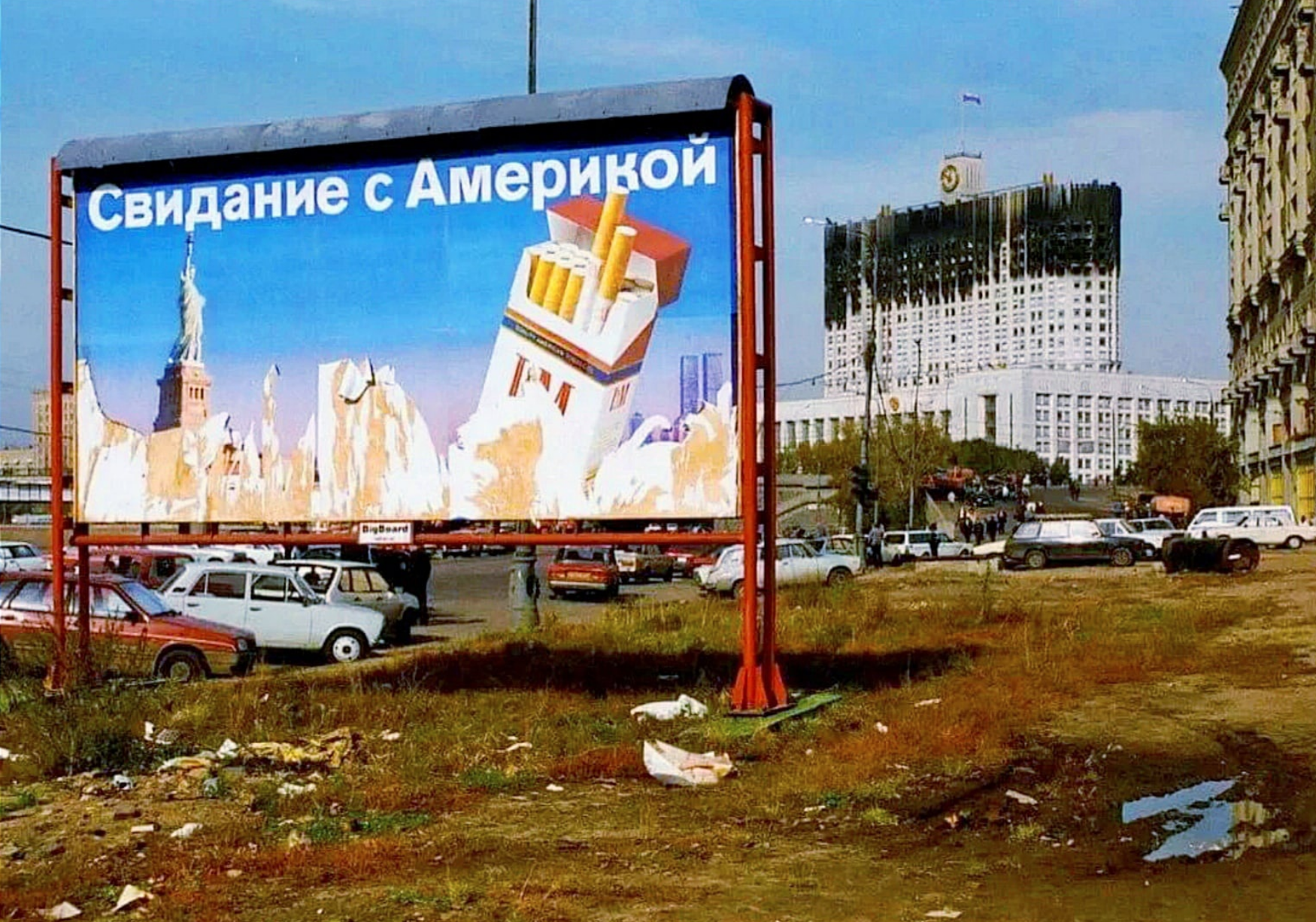Filed Under: Topic > Advertising > An Encounter with America
An Encounter with America

In Generation P (1999), Victor Pelevin’s (1962-) cult novel about the post-Soviet transition, aspiring writer-turned-adman Vavilen Tatarsky must parlay his creative talents into profitable intellectual labor by adapting Western advertising strategies to Russian consumers’ still-Soviet mentality. Tatarsky’s first commission is to create a concept for the cigarette brand Parliament, a task that he finds particularly taxing because of the brand name’s associations with Russia’s troubled recent history.
The building housing the first Russian parliament, known as the White House, is associated with two key symbolic moments in Russia’s transition to capitalism and democracy. During the August 1991 putsch, Yeltsin, surrounded by his allies, famously spoke while standing on a tank placed in front of this building. In the context of a putsch that contributed to the USSR’s abrupt dissolution, the White House stood as the stronghold of future Russian democracy and a symbol of hope. Yet only two years later, in October 1993, this same building was shelled on Yeltsin’s orders during a violent standoff with the legislature. The crisis, which resulted in up to several hundred civilian casualties, was caused by the parliament’s vote against Yeltin’s economic reforms and its attempt to impeach the president. The image of the White House in flames came to represent the premature failure of Russia’s transition to democracy.
In Pelevin’s novel, Tatarsky comes up with an idea for his ad only after a trip to the country, a mystical experience getting high on psychedelic mushrooms, and a series of encounters with several “magic objects” from the Soviet past. The result is a kitschy and surreal concept based on the documentary image of the Russian parliament on fire, in which a gigantic pack of Parliament cigarettes is superimposed over a building surrounded by palm trees and tanks aiming at it in the foreground. Pelevin follows this sequence with a quotation from Alexander Griboyedov’s 1825 play Woe from Wit, which Soviet school teachers cited ad nauseam and any Soviet citizen knew by heart: “The very smoke of our Motherland is sweet and dear to us.” In a novel where post-Soviet reality and its politics turn out to be the technologically enabled products of an elaborate media conspiracy, Tatarsky’s concept appears to indicate that language and culture as Soviet people knew them cannot grasp the historical events unfolding in front of their eyes. Dark irony and radical cynicism are the only possible responses to the void left by Soviet collapse.
The surreal, extravagant image in the photograph above accords with the equally surreal everyday reality of the early post-Soviet years. Pelevin’s fictional ad concept was itself possibly based on the L&M cigarette billboard. The burned façade of Russian parliament in 1993 clashes with the ad’s optimistic slogan, “An Encounter with America,” capturing the sense of loss inherent in post-Soviet media and culture—and the unexpectedly disappointing quality words like “freedom” or “democracy” had already acquired by the mid-1990s.
The building housing the first Russian parliament, known as the White House, is associated with two key symbolic moments in Russia’s transition to capitalism and democracy. During the August 1991 putsch, Yeltsin, surrounded by his allies, famously spoke while standing on a tank placed in front of this building. In the context of a putsch that contributed to the USSR’s abrupt dissolution, the White House stood as the stronghold of future Russian democracy and a symbol of hope. Yet only two years later, in October 1993, this same building was shelled on Yeltsin’s orders during a violent standoff with the legislature. The crisis, which resulted in up to several hundred civilian casualties, was caused by the parliament’s vote against Yeltin’s economic reforms and its attempt to impeach the president. The image of the White House in flames came to represent the premature failure of Russia’s transition to democracy.
In Pelevin’s novel, Tatarsky comes up with an idea for his ad only after a trip to the country, a mystical experience getting high on psychedelic mushrooms, and a series of encounters with several “magic objects” from the Soviet past. The result is a kitschy and surreal concept based on the documentary image of the Russian parliament on fire, in which a gigantic pack of Parliament cigarettes is superimposed over a building surrounded by palm trees and tanks aiming at it in the foreground. Pelevin follows this sequence with a quotation from Alexander Griboyedov’s 1825 play Woe from Wit, which Soviet school teachers cited ad nauseam and any Soviet citizen knew by heart: “The very smoke of our Motherland is sweet and dear to us.” In a novel where post-Soviet reality and its politics turn out to be the technologically enabled products of an elaborate media conspiracy, Tatarsky’s concept appears to indicate that language and culture as Soviet people knew them cannot grasp the historical events unfolding in front of their eyes. Dark irony and radical cynicism are the only possible responses to the void left by Soviet collapse.
The surreal, extravagant image in the photograph above accords with the equally surreal everyday reality of the early post-Soviet years. Pelevin’s fictional ad concept was itself possibly based on the L&M cigarette billboard. The burned façade of Russian parliament in 1993 clashes with the ad’s optimistic slogan, “An Encounter with America,” capturing the sense of loss inherent in post-Soviet media and culture—and the unexpectedly disappointing quality words like “freedom” or “democracy” had already acquired by the mid-1990s.